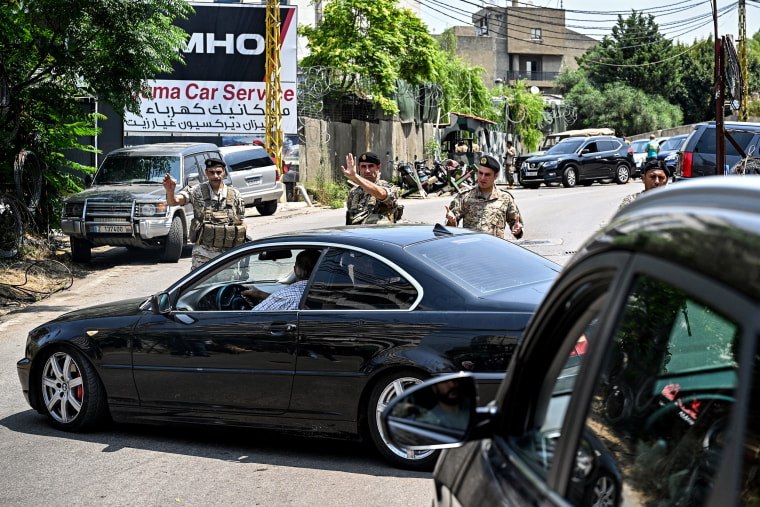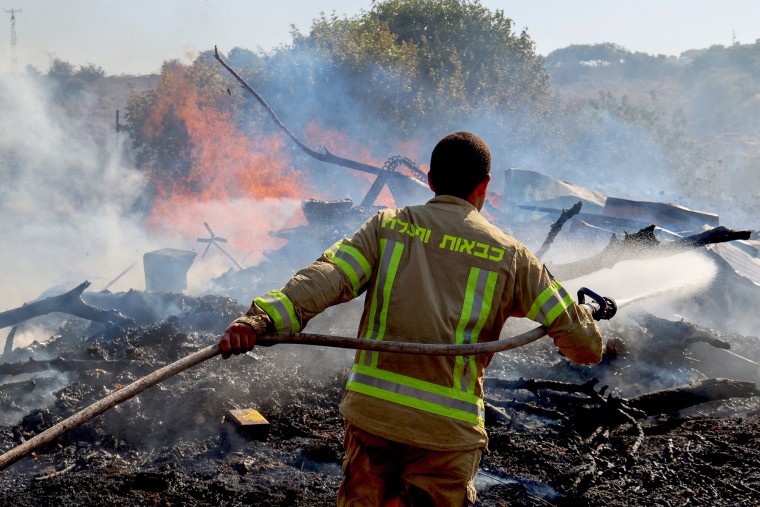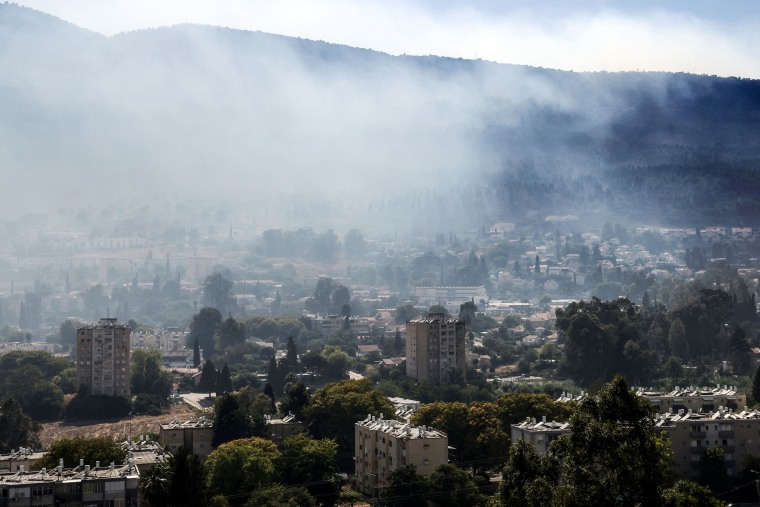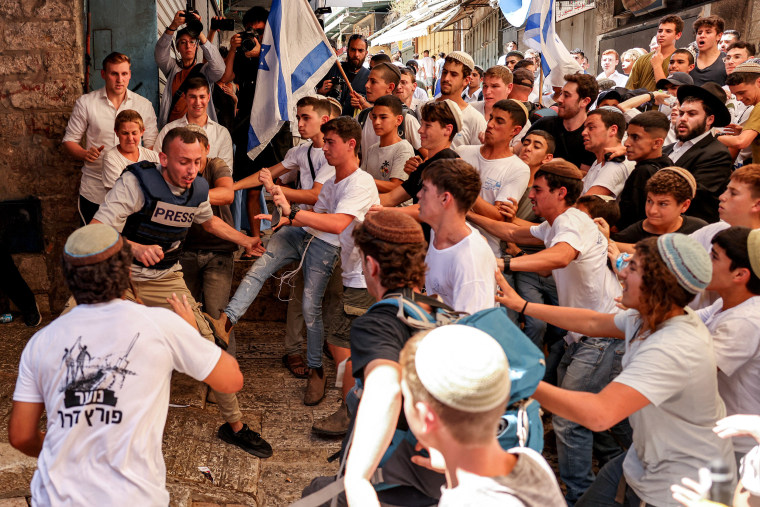A gunman was captured after opening fire at the U.S. Embassy in Lebanon's capital, Beirut, on Wednesday — an attack that took place as U.S. ally Israel signaled it could soon launch an offensive in the country against Iran-backed militant group Hezbollah.
Prime Minister Benjamin Netanyahu warned early Wednesday that Israel was "prepared for very intense action in the north," as he visited a border city hit by wildfires sparked by Hezbollah rockets.
The escalation has piled pressure on Netanyahu from right-wing members of his government, who have also threatened to quit if he agrees to a U.S.-backed proposal for a cease-fire in Gaza, where more than 36,000 people have been killed since the war began.
President Joe Biden criticized Netanyahu in a new interview, but also dispatched top aides to the region for talks as Washington pushes for a deal that would end eight months of war and secure the release of hostages held by Hamas.
Some 1,200 people were killed and around 250 others taken hostage in Hamas’ Oct. 7 attacks, according to Israeli officials, which marked a major escalation in the decadeslong conflict. Some 120 people taken hostage are believed to remain held in Gaza, with about a third of those confirmed dead.
National Security Adviser Jake Sullivan said in an interview with “TODAY” on Wednesday that Israel had reconfirmed as recently as Wednesday that the deal was “still on the table.”
“The whole world should call on Hamas to accept it,” he said.
U.S. Embassy attack
The Lebanese army said its forces responded to an attack at the U.S. embassy in Beirut Wednesday morning, firing back at a suspect who was taken to a local hospital with injuries. The U.S. embassy said "small arms fire" was reported just after 8:30 a.m. local time (1:30 a.m. ET.) It said its team was safe thanks to the "quick reaction" of Lebanese forces and the embassy's security team.
A local Lebanese guard was wounded in the incident and was receiving care, Sullivan said in his “TODAY” interview. A U.S. official told NBC News the the preliminary assessment was that the injury was minor.
The suspect's identity and any possible motive were not immediately clear, with the Lebanese military describing them only as a Syrian national.
Lebanese authorities said that the situation was stable and that investigations were underway. “I condemn the attack that took place on the U.S. Embassy in Beirut this morning,” said the country’s foreign minister, Abdullah Bou Habib.
A bombing of the U.S. Embassy in Beirut in 1983 killed 63 people, an attack that U.S. officials blame on Hezbollah. The facility was then moved to a suburb north of the capital.

Lebanon, which borders Israel to the north, has suffered years of economic misery and political chaos.
Months of exchanges between Israel and Lebanon-based Hezbollah have taken place in parallel with the Israeli military's offensive in Gaza, which was launched following Hamas' Oct. 7 attacks.
Israeli military chief Lt. Gen. Herzi Halevi said Tuesday that troops were prepared to "move to an offensive in the north.”
“We are approaching a decision point,” he said in a recorded statement.
Pressure has intensified on Netanyahu to act this week after rockets fired by the militant group set off wildfires in the area.
“One way or another, we will restore security to the north,” Netanyahu said Wednesday on a visit to Kiryat Shmona.
“There can’t be peace in Lebanon while they are causing destruction here,” his hard-line national security minister, Itamar Ben-Gvir, said in a video statement following a tour of the northern city. “We need to burn all Hezbollah strongholds and destroy them. W-A-R!”


Cease-fire talks
Ben-Gvir has threatened to collapse Netanyahu's government if he agrees to a cease-fire proposal outlined in Biden's surprise announcement Friday, raising doubts over Israel's stance even as the families of remaining hostages push for a deal.
CIA Director William Burns is expected to return to Doha to meet with Qatar’s prime minister, in a bid to advance negotiations for a truce deal, a source with knowledge of the negotiations told NBC News.
White House Coordinator for the Middle East Brett McGurk is also heading back to the region this week for further hostage talks, according to a U.S. official. McGurk will also be taking part in discussions about Israel’s latest movements in the southern Gaza city of Rafah, the official said.
In an interview with Time magazine that was conducted May 28 and published Tuesday, Biden said there is "every reason" to believe Netanyahu is prolonging Israel's war against Hamas in Gaza for political gain.
In Israel, thousands of nationalists gathered for the “Jerusalem Day” parade — an annual event that marks Israel’s capture of the Old City nearly in 1967 — and one that has caused past friction between Jews and Palestinians in the city.
In images capturing the event, Israeli right-wing activists could be seen appearing to scuffle with a journalist wearing body armor identifying him as “press.”
Hamas condemned the march, calling it an “aggression against our people and their sanctities.”

Hezbollah, an ally of the Palestinian militant group, has previously said it will continue to strike Israel until its offensive in Gaza comes to an end.
In a rare and exclusive interview with NBC News in April, the political party and militia’s second-in-command Naim Qassem said that Hezbollah was determined not to ramp up its attacks across Lebanon’s southern border, but said it would respond in kind to any Israeli escalation.
“We didn’t expect the war would last this long because we didn’t think that Netanyahu was that foolish,” Qassem said at the time.
Hundreds have been killed and tens of thousands of people evacuated from their homes on both sides of the border, as tensions between Israel and Hezbollah have plummeted to their worst point since a 2006 war.
The possibility of a new Israeli offensive in Lebanon has fueled concerns of a wider conflict, after eight months of war that local officials say has already killed more than 36,000 people in Gaza.
The IDF said Wednesday it had launched new operations in the areas of the Bureij refugee camp and eastern Deir al-Balah in central Gaza, where many have fled seeking safety from the military’s deepening offensive in Rafah.
United Nations agencies warned Wednesday that over 1 million Palestinians in the enclave could face the highest levels of starvation by the middle of July if fighting continues.
In a joint report, the World Food Program and Food and Agriculture Organization said hunger was worsening in Gaza amid difficulties in getting aid into the enclave and the collapse of local food systems.
CORRECTION (June 6, 2024, 9:30 a.m.): Due to editing errors, a previous version of this article should not have been corrected. The original version was accurate: The April 1983 bombing of the U.S. Embassy in Beirut killed 63 people. (That October, 241 American military members were killed in a bombing of a U.S. military barracks in Beirut.)

